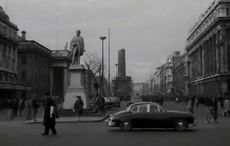| The Guildhall in Derry |
In my town young people left home at 18. They still do. It's an annual generational exodus that I can't recall a single person ever questioning.
Year after year the familiar faces vanish. Sometimes you'll run into them later between Christmas and New Year's Eve, but a lot of times they vanish forever.
Very little is said about this when you consider what a severance it is.
Where we lived in Co. Donegal, perched on the edge of the wide Atlantic Ocean, was unforgettably beautiful, but it was also usually cash strapped. It was expected you'd make your way toward brighter lights. There is no lure like the lure of fortune, after all, and it could get quiet enough around those parts after dark.
Caught in the gravitational pull of community expectations, I left home too.
Unlike a lot of my peers at the time I had some cash in my pocket, and that bought me time to study and reflect. I didn't feel the vertigo of suddenly having to make my way, unaided, in some foreign place.
Free time and a bank balance can lead you into mischief, but more and more it led me into libraries. I had become fascinated by the works of Brian Friel, a singular Irish consciousness and a local one too, and his plays inevitably led me on to the works that had inspired them.
Because of Friel I was becoming an accidental historian. It was a terrific surprise, because in school I had found the modern Irish curriculum particularly dispiriting.
Irish history as presented by the Department of Education was most often a recitation of defeats, disasters and ignominy. You'd almost need counseling at the end of it. It was news to me later on to discover that I hadn't even heard half of the tale.
But the most enduring lesson of Irish history that I ever learned was what my town looked like after my class was scattered around the globe.
Places where a friend and I had sat together and laughed or had an adolescent fumble, or where one of us sang or fought or were generally happy once, looked haunted to me now whenever I returned.
It was because an invisible line had been drawn under their possibilities. That line had been crossed, that chapter closed, there would be no way back.
It's like a death really. But there's no wake and there's no acknowledgement.
No one even seems to notice that something remarkable is occurring.
The irony – one of the ironies – is that if ever there was a teenager stamped for export, it was me.
In my formative years I had found my town insular and sometimes suffocating. But I had made good friends there who felt the same pressures, and we helped each other navigate those years.
Now, because of my father’s poor health, I found myself back in Donegal far more often than I expected. And because of my own studies I found myself recognizing ruined castles and cairns and abandoned workhouses and famine plots and knowing their history for the first time.
I was learning who had lived in them and what fate they had encountered. I knew what all those stark ruins had once meant to the life of the place.
Curiously, rather than connecting me more deeply to my town of origin, I discovered that my studies were carrying me further out. This was knowledge that had not been passed on, I realized. It was all available, if you had the time, but who had the time?
One rainy afternoon in the early 1990s I walked into the Guildhall in Derry. It was October and the sun was already plummeting by mid afternoon.
I made some enquiries at the front desk and within less than five minutes I found myself picking up the early 16th century sword of the last Gaelic chieftain.
It was a toledo blade. The engravings were so finely wrought they could only have come from that transformative century.
It was a dressage sword and its breathtaking elegance said a great deal about its owner. I studied it meticulously, and I can recall its design clearly now.
What's remarkable is that the staff of the Guildhall had handed it over to a bookish teenager who had walked in off the street. So I don't know if they quite realized what they were preserving. In any case a door opened into the past that had had a line drawn across it.
That sword was a key, an almost lost one, to a vanished world. The disaster of the famine and the loss of our language in the 19th century had so distorted our image of ourselves, had broken the link of our history, that it had made us provisional and reactionary and small.
That sword was proof we didn't always look like that. But in all of the northwest, I realized, there were perhaps 20 people who knew where it was kept, or who had it had once belonged to, or what it had meant and means. And they were as scattered to the four winds as the Earls and my own peers.




Comments